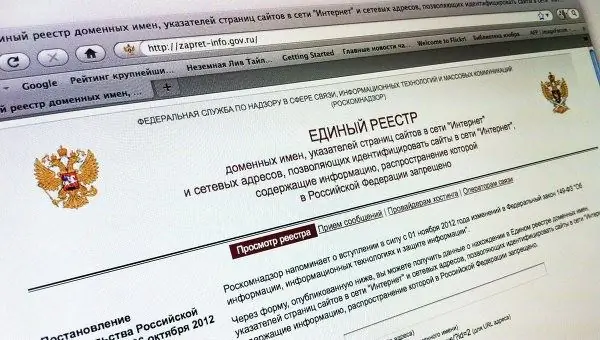- Author Lauren Nevill nevill@internetdaybook.com.
- Public 2023-12-16 18:48.
- Last modified 2025-01-23 15:15.
Prohibited sites and the registry for them is a long-needed measure to protect minors in the first place from information that is not for their eyes. This list may include sites pre-trial if they contain information that contradicts the legislation of the Russian Federation, as well as by a court decision.

Reasons for banning sites
The list of prohibited topics for sites is as short as possible - child pornography, propaganda of drugs and other substances, calls for suicide and terrorism. This is that gentleman's set that gathers people for unwanted discussion, teaching a bad lesson.
By a court decision, any site may be closed, the main thing is that the evidence is strong, and the topic can be tied to the laws of the country. In this case, the site is not completely closed, but only the.ru domain address is blacklisted by Internet providers in Russia. An example of a provider would be Rostelecom.
The lists of prohibited sites are updated every day. This is how objectionable torrent trackers, pornographic sites, politically undesirable portals and other sites can be buried. In the hands of the state, this is a powerful weapon for prohibiting unnecessary information. When you go to one of the prohibited addresses, you are shown a page with information when this site was entered in the unified state register.
What to do if the site is banned
Still, there are ways to bypass these provider bans. A person who needs to get to such a site can use the Tor Project anonymous browser based on Mozilla Firefox, an anonymizer or a proxy server. All these technologies in one way or another help you to spoof the site address. That is, you refer to an unauthorized site address, and it, in turn, gives you the information of the prohibited one. That is, through another site you are viewing the desired one.
These technologies are very old, but still work nonetheless. Perhaps this also serves as a certain protection from children. They are unlikely to figure out what and how to do, but an adult will be able to gain access. Blacklisting sites is practiced not only in Russia, but also in other countries. And some of the above bans are international.
In our country, everything is not so bad with access to information and the Internet in particular, for example, in China, government services monitor the network activity of people. Some sites, after being entered into a single register, lose a lot of visitors and if there is an opportunity to prove safety, then the site is returned to public access, this practice already exists. Also, very often sites from one domain are transferred to another, so that all users can visit it again for some time until the next ban.






